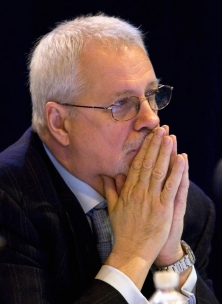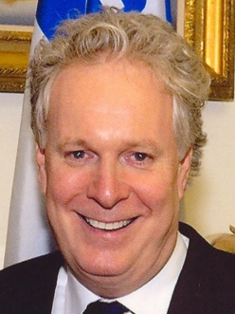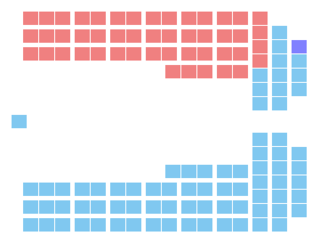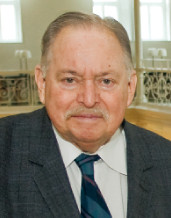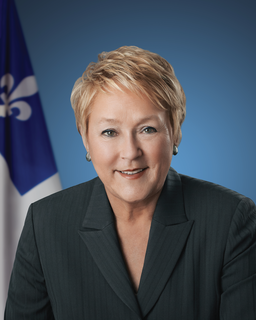| |||||||||||||||||||||||||||||||||||||||||||||
122 seats in the 32nd National Assembly of Quebec 62 seats were needed for a majority | |||||||||||||||||||||||||||||||||||||||||||||
| Turnout | 82.52% | ||||||||||||||||||||||||||||||||||||||||||||
| |||||||||||||||||||||||||||||||||||||||||||||
| |||||||||||||||||||||||||||||||||||||||||||||
The Quebec general election of 1981 was held on April 13, 1981, to elect members of the National Assembly of the Province of Quebec, Canada. The incumbent Parti Québécois , led by Premier René Lévesque, won re-election, defeating the Quebec Liberal Party, led by Claude Ryan.

The National Assembly of Quebec is the legislative body of the province of Quebec in Canada. Legislators are called MNAs. The Queen in Right of Quebec, represented by the Lieutenant Governor of Quebec and the National Assembly compose the Legislature of Quebec, which operates in a fashion similar to those of other Westminster-style parliamentary systems.
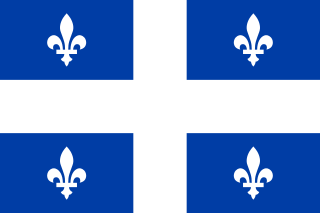
Quebec is one of the thirteen provinces and territories of Canada. It is bordered to the west by the province of Ontario and the bodies of water James Bay and Hudson Bay; to the north by Hudson Strait and Ungava Bay; to the east by the Gulf of Saint Lawrence and the province of Newfoundland and Labrador; and to the south by the province of New Brunswick and the U.S. states of Maine, New Hampshire, Vermont, and New York. It also shares maritime borders with Nunavut, Prince Edward Island, and Nova Scotia. Quebec is Canada's largest province by area and its second-largest administrative division; only the territory of Nunavut is larger. It is historically and politically considered to be part of Central Canada.

The Parti Québécois is a sovereignist and social democratic provincial political party in Quebec, Canada. The PQ advocates national sovereignty for Quebec involving independence of the province of Quebec from Canada and establishing a sovereign state. The PQ has also promoted the possibility of maintaining a loose political and economic sovereignty-association between Quebec and Canada. The party traditionally has support from the labour movement, but unlike most other social democratic parties, its ties with organized labour are informal. Members and supporters of the PQ are called "péquistes", a French word derived from the pronunciation of the party's initials.
Contents
The PQ won re-election despite having lost the 1980 Quebec referendum on sovereignty-association, the party's proposal for political independence for Quebec in an economic union with the rest of Canada. To some extent, they were helped by Claude Ryan's old-fashioned campaign style: he refused to tailor sound bites for the evening news and ran a campaign generally unsuited for television coverage. Despite finishing only three percent behind the PQ, the Liberals still finished a distant second, with 42 seats to the PQ's 80. Historically, provincial elections in Quebec produce large disparities between the popular vote and the actual seat count.
A sound bite is a short clip of speech or music extracted from a longer piece of audio, often used to promote or exemplify the full length piece. In the context of journalism, a sound bite is characterized by a short phrase or sentence that captures the essence of what the speaker was trying to say, and is used to summarize information and entice the reader or viewer. The term was coined by the U.S. media in the 1970s. Since then, politicians have increasingly employed sound bites to summarize their positions.
The Union Nationale, which had won 11 seats in a modest comeback in the 1976 general election, was reduced to five seats at dissolution by numerous floor crossings, retirements and resignations. Among the departures was that of its leader in the 1976 election, Rodrigue Biron, who crossed the floor to the PQ. The once-proud party lost all of its remaining seats, never to return. The party essentially ended at this point, though it lingered in desultory fashion until 1989.

The Union Nationale was a conservative and nationalist provincial political party in Quebec, Canada, that identified with Québécois autonomism. It was created during the Great Depression and held power in Quebec from 1936 to 1939, and from 1944 to 1960 and from 1966 to 1970. The party was founded by Maurice Duplessis, who led it until his death in 1959.
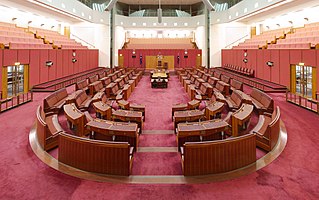
In politics, crossing the floor is when a politician changes their allegiance or votes against their party in a Westminster system parliament. Crossing the floor may be voting against the approved party lines, or changing to another party after being elected while a member of a first party. While these practices are legally permissible, crossing the floor can lead to controversy and media attention. As well, voting against party lines may lead to consequences such as losing a position or being ejected from the party caucus.




